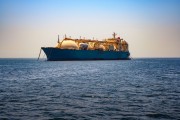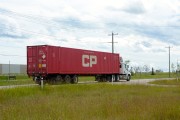Canada is "celebrating" an anniversary of failure to tackle global warming this week. On April 26, 2007, Stephen Harper's government unveiled its "Turning the Corner" plan to regulate greenhouse gases. The media release proclaimed that "Canada's New Government will impose mandatory targets on industry, so that greenhouse gases come down."
Two years later, there are no mandatory targets for industry and no regulations; the government has not even published draft ones. The government did publish Canada's latest greenhouse gas numbers last week, and they're higher than ever. Countries are working feverishly to complete a new global climate treaty by year's end, but Canada is still coming to the table empty-handed.
Heavy industry accounts for half of Canada's greenhouse gas pollution. A Liberal government first committed to regulate industrial emissions in November 2002, then repeated the promise in April 2005. The Conservative government unveiled its own proposal in October 2006 and revised versions in April 2007 and March 2008. Now it's April 2009, and there are still no regulations.
Sure, we have federal grants to retrofit homes, subsidies for renewable energy and investments in research. But in their current form, these programs barely scratch the surface of the problem. Even scaled up, they would at most be part of the solution.
The only ways to really "Turn the Corner" on the growth in our emissions is to cap them through regulations or to tax them. Successive federal cabinets have failed to do this because they didn't have the political will.
This presents our current Environment Minister, Jim Prentice, with a big opportunity. He can be the one to prove that Canada is finally serious about cutting greenhouse gas pollution.
Mr. Prentice has called 2009 a "pivotal year" for action on global warming. Governments will gather in Copenhagen in December to agree a new UN treaty on greenhouse gas reductions. Congress is debating legislation to cap U.S. emissions, and President Obama is moving to regulate them in case Congress can't pass a bill.
The truth is that the "Turning the Corner" plan was so flawed that it became a liability the moment the Americans got serious. So Mr. Prentice has promised to unveil new emissions "rules," aligned with the more rigorous U.S. approach, in time for the Copenhagen conference.
But if those rules are just another description of a framework - a mere political promise with the actual regulations left for later - why should anyone believe that promise after all the past broken ones?
The bar is higher now. Canadians have been let down too often; scientists have warned us that the climate threat is bigger and more urgent; years have been wasted. To have a minimum of credibility when he arrives in Copenhagen, Mr. Prentice needs to have already initiated the legal process required to cap Canadian emissions.
To earn Canadians' praise, the regulations will have to exhibit real leadership - not just copy whatever compromise may emerge from the U.S. Congress. This means three things.
First, Canada must set an emissions cap tight enough to immediately start moving investments into cleaner technology. And the cap needs to cover as high a proportion of national emissions as possible; this means not just industry but transportation and buildings too.
Second, the regulations need to be simple and transparent. Complicated exemptions and giveaways will only delay implementation. There must be no special treatment of Alberta's oilsands and no loopholes that allow firms to cut emissions on paper but not in reality.
Third, Canada's approach must reflect the urgency of the climate threat and provide the certainty craved by investors. Alberta was able to have greenhouse gas regulations in place (albeit very weak ones) just four months after announcing them in 2007. With sufficient political will, there's no doubt that a federally regulated emissions cap can be in force by the summer of 2010.
Governments worldwide have acknowledged that the economic downturn cannot be an excuse to delay action on global warming. Instead, the downturn is an opportunity to ensure that when growth resumes, it is concentrated in the clean energy, low-emission economy of the future. A well-designed regulated cap on emissions is the main tool we need to get there.
This week, Mr. Prentice is in Washington at a meeting of "major economies" convened by President Obama to help advance the global climate negotiations. Our repeated broken promises and failure to act will make it very hard for any of the other countries present to take Canada seriously.
Between now and the UN climate conference in December, Mr. Prentice has the opportunity to truly "turn the corner" by finally putting an end to Canada's years of inaction. Let's hope he seizes it.





